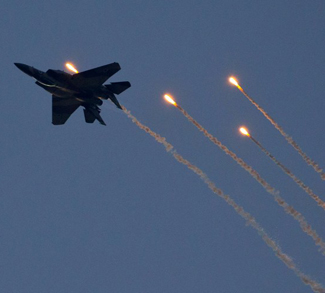Summary
U.S. Secretary of State Condoleezza Rice paid a visit to Palestinian President Mahmoud Abbas in the West Bank, providing support to the latter in his ongoing confrontation with rival Hamas, while also acknowledging the end of the Bush administration’s peace initiative. Responsibility for the proposed peace deal will now rest with the Obama administration, prepared to take office in January during the very climax of Palestine’s looming constitutional crises. Meanwhile, Israel and Palestinian militias in Gaza, Hamas and Islamic Jihad, have exchanged fire across the Israel-Gaza border, breaking the five-month old ceasefire.
Analysis
Israeli-Palestinian peace efforts are quickly unravelling, raising tensions to dangerous levels and leaving the future of Israeli-Palestinian peace in severe doubt. On Saturday, the lame duck Secretary of State paid a visit to Palestinian President Abbas in the former militant stronghold of Jenin, in the West Bank. Condoleezza Rice used the occasion to acknowledge that the end-of-year deadline the Bush administration had proclaimed would not be met.
The visit was also a show of support for Abbas in his ongoing confrontation with rival Hamas, underscored by choosing a venue that Abbas’ Fatah faction has wrested from Hamas militants., in an effort to bolster Abbas ahead of the looming constitutional crises projected for January when Abbas’ presidential term ceases.
Hamas, in turn, cancelled this weekend’s unity talks with Fatah in Cairo, sponsored by the Egyptians. Ostensibly, the unity talks were cancelled due to Abbas reneging on a deal to grant amnesty to a number of Fatah-held Hamas militants, though Hamas did upstage their rivals by cancelling the talks at the last minute, humiliating the Fatah negotiators stranded in Cairo. It remains to be seen how much influence Rice had in convincing Abbas to renege on his deal with Hamas, collapsing the unity talks that would have shattered American foreign policy vis-à-vis Palestine.
Israel, meanwhile, broke the five-month old ceasefire with the Gaza militants by conducting a raid into Gaza this past Tuesday, and firing an airstrike into the territory the next day, killing half a dozen Palestinian militants. Hamas, and the second most powerful militia in Gaza, Islamic Jihad, responded by firing homemade rockets into Israel’s Negev desert, without any casualties. The renewed armed hostilities threaten the fragile peace achieved by the summer truce.
So, why the upturn in violence?
It appears that the U.S. and Israel are desperate to ward off any potential alliance between Hamas and Fatah. Such a unity government would break the anti-Hamas policy of both states, and rend the economic blockade of Gaza. Both the Bush administration and the Israeli authorities are intent to prevent the normalization of relations between the Palestinian rivals for fear that such an outcome would legitimize Hamas.
Instead, Israel and the U.S. are hoping to escalate the split between the two Palestinian groups, both by increasing tensions between the two (over issues such as the reneging on the deal to release Fatah-held Hamas loyalists) and escalating the violence along the Israeli-Gaza border, thereby increasing Hamas’ criticism of the pro-Israeli Abbas and limiting the latter’s capacity to sit in a unity government with a group fighting an active war against his partner in the peace negotiations.
The confrontation will come to a head in January, when the looming Palestinian constitutional crisis threatens to submerge the Palestinian territories into political chaos.
Interestingly, neither the incoming Obama administration, nor the new Israeli interim Prime Miniter, Tzipi Livni, have signalled any change in Israeli-American anti-Hamas policy. Significantly, although both new administrations are considered to be pro-peace, neither appears to have prepared for any alternatives towards peace different than their predecessors’.
In the Middle East, then, the more things change, the more they stay the same.
Manjit Singh is a contributor to Geopoliticalmonitor.com



